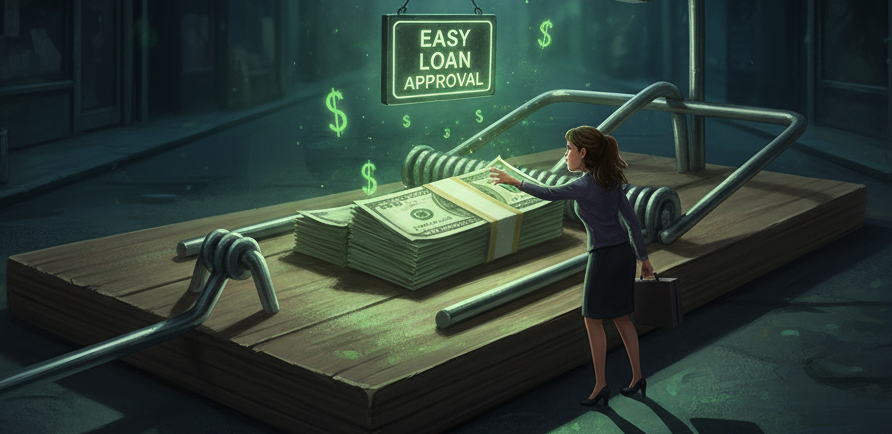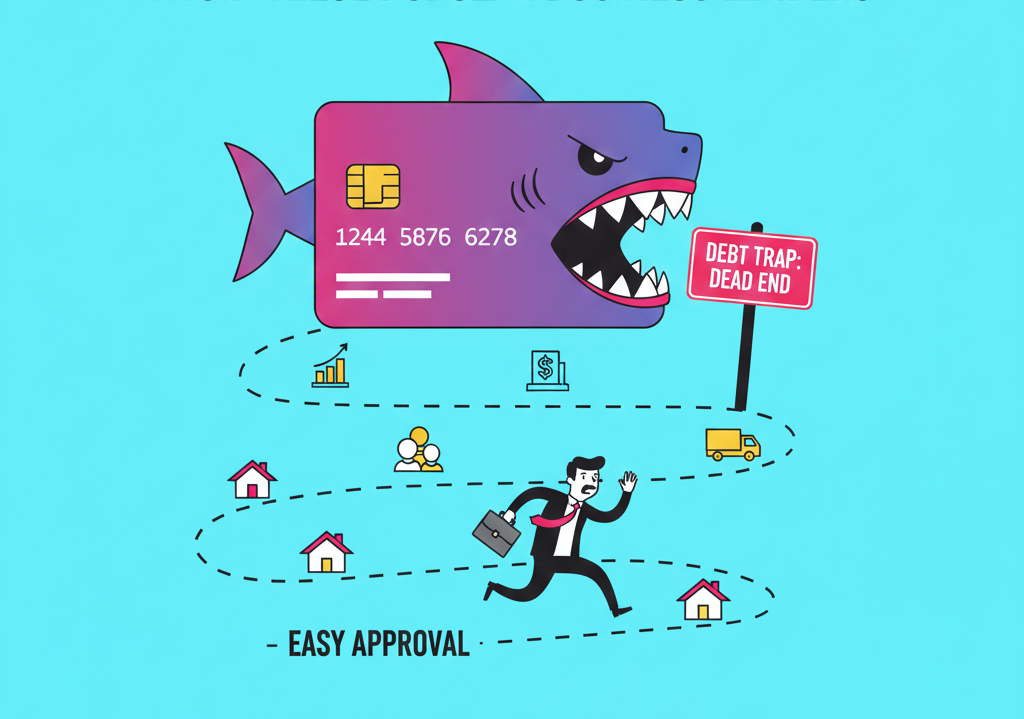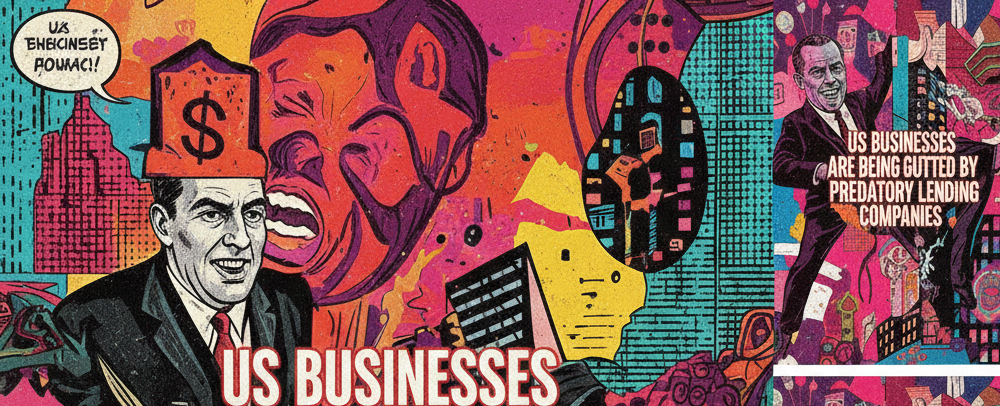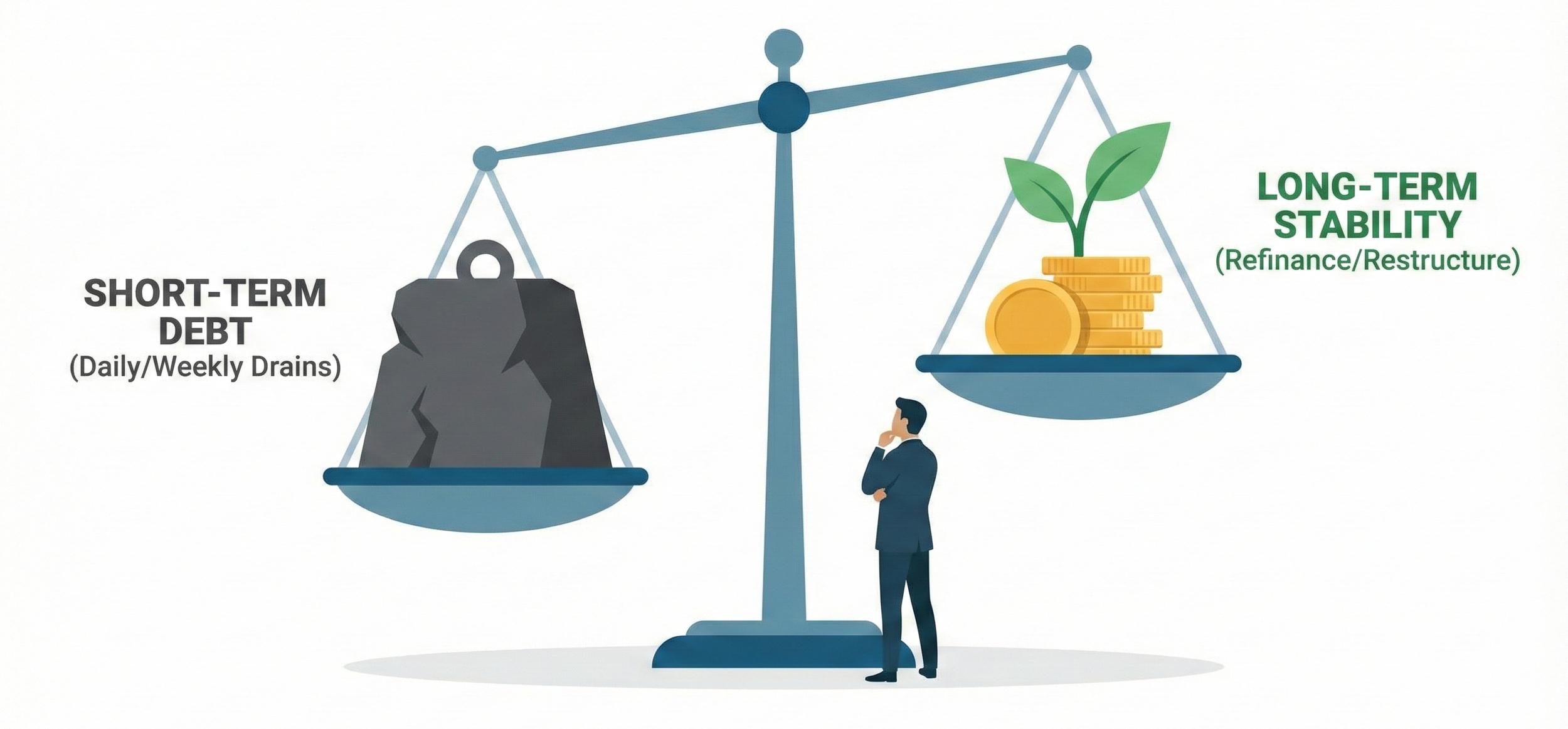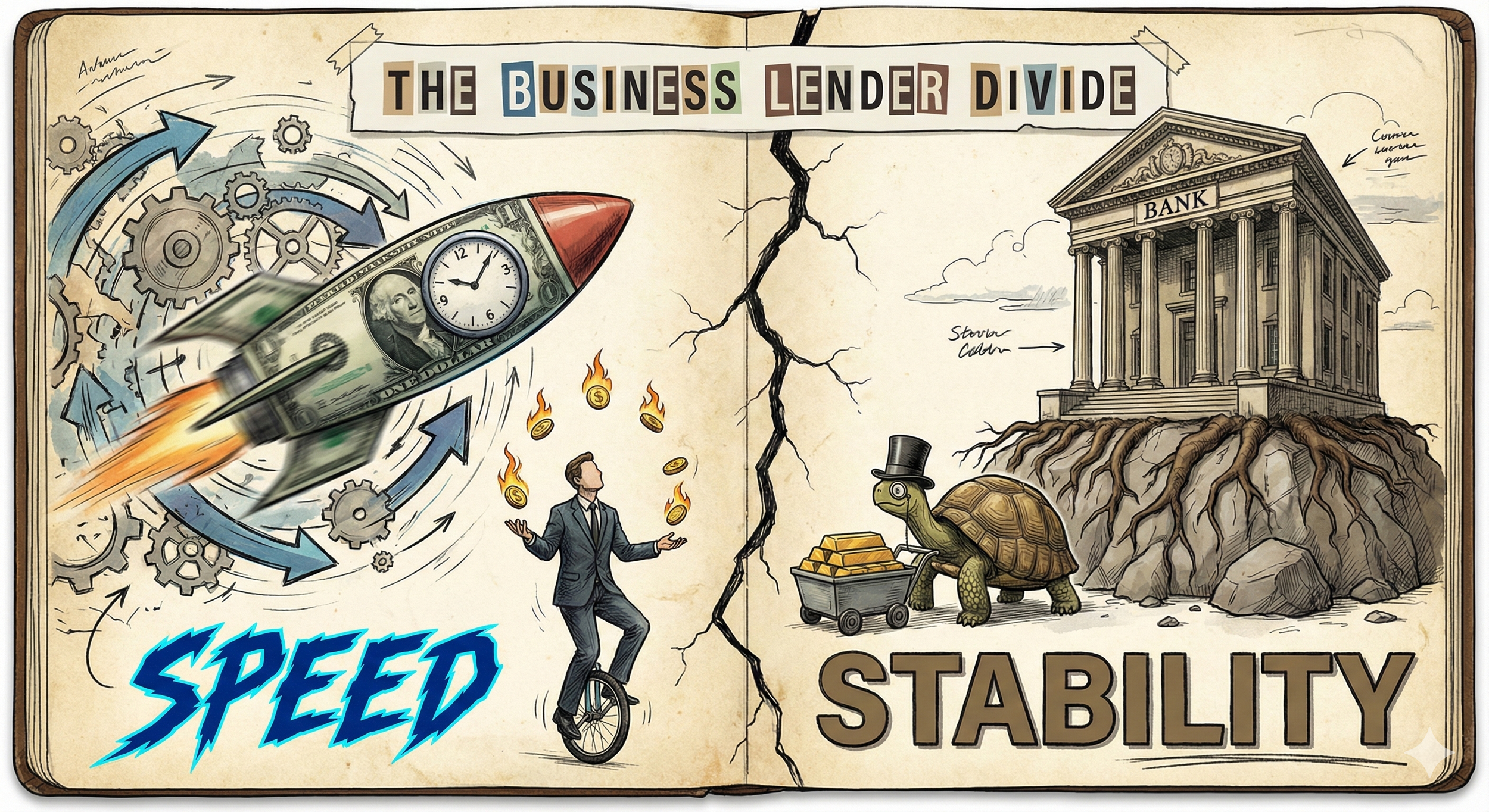You're already the CEO, the head of sales, and the entire customer service department. When it comes to finding small business financing, the last thing you need is another headache—especially one caused by bad advice.
Capital is the fuel for business growth, yet navigating the world of business loans and investments can feel like a minefield of conflicting information. So, how do you sort the genuine opportunities from the dangerous pitfalls?
This article cuts straight to the core by revealing the most common and costly financing myths that sabotage business owners, giving you a clear, confident path to securing the right funding.
The "Just Get Any Loan You Can" Fallacy
Stop right there. The most dangerous lie you can ever believe is that "a bad loan is better than no loan." This desperate mindset will sink your business faster than any market downturn.
A loan with crippling interest rates, hidden fees, and inflexible terms isn't a lifeline; it's a financial anchor dragging your company to the bottom. We're talking about loans with 30% or 40% interest. Imagine borrowing $100,000 at 35% interest. You'll be making payments so high that a huge chunk of your revenue goes directly to the lender, not back into your business. You're not building a company; you're working for someone else.
Your first move must be to stop and assess your needs.
What is the money actually for?
A new piece of equipment demands a different financial tool than bridging a seasonal gap in cash flow. Don't grab the first offer. Shop around. Compare rates, fees, and penalties.
Understand the total, lifetime cost of that loan. This isn't a casual decision; it's a critical investment in your future. The wrong financing can ruin you, so the right financing is worth the fight.
Ignoring Your Personal Credit Score
"Your business is a separate entity, so your personal credit doesn't matter." If you believe this, you're about to make a catastrophic mistake. For a small business, especially a new one, your personal credit score is everything. Lenders don't have a long history for your company, so they look at you.
Your personal credit is a direct reflection of your reliability as a borrower. A low score is a giant red flag that can get your application immediately rejected or, worse, land you a high-interest loan that you can't afford.
A great personal credit score is your secret weapon. It unlocks access to traditional bank loans with the lowest interest rates. It gives you leverage to negotiate.
So, what are you waiting for? Check your credit report now. Look for errors, and fix them. Work to improve your score by paying bills on time and keeping balances low. This isn't optional; it's a non-negotiable step to secure the financing you need.
The "Crowdfunding is Free Money" Myth
The idea that you can just put an idea on Kickstarter and get a flood of cash is a fantasy. Crowdfunding is not free money; it’s a high-stakes, public-facing job. A successful campaign requires a massive amount of work before, during, and after. You need professional videos, compelling photos, and a strong narrative. Then you have to relentlessly market it for months just to build an audience.
And once you hit your goal, the real work begins. You're now on the hook to manage thousands of backers, manufacture your product, and handle all the logistics. The platform and payment fees alone can eat up 20% or more of your funds. Get it wrong—delays, shipping issues, or a flawed product—and the public backlash will destroy your brand overnight. Crowdfunding is a powerful tool, but it demands relentless effort and flawless execution.
Confusing a Business with a Personal Loan
Using a personal loan for business expenses is a ticking time bomb. This simple, lazy shortcut blurs the lines between your personal and business finances, and it puts everything you own at risk. When you use a personal loan, you are personally liable for that debt. If your business fails, your home, your car, and your savings could potentially be seized to pay it off. A business loan, on the other hand, often ties the debt to the business entity, sometimes protecting your personal assets.
This financial mess also makes it impossible to track your business's true health and complicates tax season, raising red flags with the IRS. Don't do it. Get a separate business bank account and credit card today. This is the simplest and most critical step you can take to protect your future.
Believing Interest Rate is the Only Factor
A low interest rate looks great on paper, but it's a distraction if you're not looking at the big picture. Focusing only on the APR is a fatal error that can lead you into a loan that costs you far more than you think. What about the origination fees? A 5% fee on a $100,000 loan means you’re only getting $95,000 but still paying back the full $100,000 plus interest. That seemingly low-interest rate just became a very expensive loan.
And what about the terms? Is there a balloon payment at the end that you can’t afford? Are there massive prepayment penalties that lock you into the loan even if you want to pay it off early? A loan's value is not in its interest rate alone; it's in its total cost and its flexibility. Demand a full breakdown of every fee and cost. Know exactly how your payments will be applied. Transparency is key, and a lender who is hiding fees is a lender you can't trust.
Thinking a Business Plan is Just for Banks
This isn't just a document for a bank; it's your strategic survival guide. Believing a business plan is an optional formality for alternative financing is a foolish mistake. A business plan forces you to think through every aspect of your company: your market, your competition, your strategy, and your finances. Without one, you're just drifting, reacting to problems instead of proactively solving them.
Your business plan is your roadmap. It's how you measure progress and stay on course. To an investor, it's proof that you’re a professional who understands the risks and rewards. Don't be the person who shows up with just an idea. Be the one who shows up with a detailed, well-researched plan that proves you can build a sustainable, profitable business.
Failing to Prepare for Rejection
The naive advice to "be confident and you'll get the loan" sets you up for failure. Confidence is fine, but preparing for rejection is a necessity. A rejection isn't a judgment on you; it’s a data point. It’s information you can use to improve your next application. Don't take it personally.
When you're rejected, immediately ask for feedback. Was it your credit score? Your collateral? Your business plan? Get the details.
This knowledge is priceless. It tells you exactly what to fix. And most importantly, have a Plan B. Do you have a list of online lenders, credit unions, or other financing options ready to go? A backup plan reduces the stress of a rejection and keeps you moving forward, not giving up.
Underestimating the Power of RelationshipS
In a world of automated online applications, it's easy to forget that a human connection can save your business. Relying solely on a digital form means you're just a number. But building a relationship with a local loan officer at a community bank or credit union is an incredible asset. They know the local market and are invested in your success.
They can offer personalized advice and connect you with other business owners. They can see past a small flaw in your application and see your potential. This personal connection is your advantage. Start building it now. Open a business account, get to know the people there, and show them you’re serious. When you need help, they'll see you as a person, not a credit score.
Thinking All Business Loans are the Same
This assumption is a rookie mistake. The world of financing options is vast and varied, and each tool has a specific purpose. You can't use a hammer to drive in a screw. You can't use the wrong loan for your business needs.
● SBA Loans have great terms but a tough application process.
● Term Loans are for big, long-term purchases.
● Lines of Credit are for managing cash flow.
● Merchant Cash Advances are a trap of high interest rates and short-term payback
● Invoice Factoring gets you cash fast, but at a cost.
You must understand the function of each option. Are you buying equipment or just trying to survive a slow month? Choosing the wrong tool will get you rejected or put you in a worse financial position than when you started.
Waiting Until You're Desperate to Seek Financing
"I'll worry about financing when I need it." This is the most dangerous form of procrastination. Waiting until you are in a cash flow crisis to seek money is financial suicide. Desperation is a weak negotiating position, and lenders can smell it. They'll offer you terrible terms because they know you'll take them.
The only time to seek financing is when your business is healthy and growing. When your numbers are strong, you have the power. You can shop around, compare offers, and negotiate for the best rates.
Don't wait for a rainy day to get your umbrella. Build a relationship with a lender and get your finances in order now, when things are good. This proactive strategy puts you in control and gives you the peace of mind to seize opportunities and weather any storm without the stress of a financial crisis. Your future depends on it.
What is the Best Way to Deal with Business Debt Payments that are Too High and causing Business Cash Flow issues?
It is NOT by stopping ACH payments.
It is NOT by taking on another business loan.
It is NOT ALWAYS a Refinancing
It is NOT by entering into a debt settlement program.
Find out the BEST strategies to get your Business back to where it was
More Business Finance and Strategy Articles:
For the average small and medium-sized business owner, the interest rate is the most visible metric, the one we are taught to haggle over, and the one that feeds the ego. We want to brag about a "cheap" loan. But in the cold, hard reality of the balance sheet, a low interest rate is a vanity metric. If you are prioritizing the cost of capital over the amortization schedule (payback period), you aren't being frugal—you are being dangerous. You are effectively prioritizing the "price" of the money over your company’s ability to draw its next breath.
The cost of capital tells you what the business debt costs in a vacuum. Business loan amortization tells you whether that business debt will actually fit through your front door without breaking the hinges. An 25%+ interest rate on a loan that must be repaid in twelve-four months can be a death sentence, while an 11% rate spread over ten years is a strategic asset. If you want your business to survive a downturn or fund a massive expansion, you must stop obsessing over the rate and start weaponizing the business debt payback timeline.
As a business owner, you wear more hats than any single person should. But when it comes to business financing and cash flow—the very lifeblood of your operation—even a small misstep can have a ripple effect that touches every corner of your business.
Strategic financing is not just about securing capital; it’s about making every dollar count, preserving your solvency, and setting the stage for sustainable growth.
This article is your practical guide to the most common, yet most damaging, business financing mistakes businesses make. More importantly, we’ll provide concrete, step-by-step solutions to help you fix them if they’ve already happened, and build a more resilient business financial future.
When the problem you need to solve is a lack of capital, the path forward can seem foggy and fraught with peril. You know you need money to grow your business, to hire, to purchase equipment, or simply to survive a cash-flow crunch. In your search for a solution, you will inevitably encounter two very different types of professionals: the Business Finance and Strategy Advisor and the Transactional Business Funding Broker.
To the uninitiated, they might seem to serve the same purpose—they both help you get money for your business. However, this is like saying a fast-food cashier and a personal nutritionist both help you get food. While technically true, their roles, processes, motivations, and the long-term impact on your business's health are worlds apart.
Choosing the right partner and advisor isn't just a simple decision; it's a strategic choice that can define your company's trajectory for years to come. This article will demystify these roles, explore their profound differences, and empower you to decide which one is the right fit for your unique situation. We will journey beyond the surface-level pitch and delve into the core philosophy that separates a one-time transaction from a long-term strategic partnership.
Managing business debt and navigating the sometimes choppy waters of business creditor relations is a constant, demanding task. You juggle inventory, payroll, and customer service, all while trying to keep your financials stable and compliant.
But what happens when the waters turn turbulent, and an aggressive junior (subordinate) creditor (provides business loans “behind” or “after” your first creditor) starts applying serious pressure? You might feel exposed, even desperate.
This is precisely when understanding the role of your senior business creditor becomes not just prudent, but a vital strategic advantage. They are not merely the holder of your largest debt; they are, in many crucial ways, your most powerful, and often unexpected, ally.
This article will define these two critical creditor types and explore the multifaceted ways your senior lender can become your shield and guide in times of financial duress. Understanding this dynamic is key to surviving and thriving when faced with an uncompromising junior business debt lienholder.
It is the ultimate gut-punch. You pull your year-end reports, and the numbers are screaming success. Your Profit and Loss statement shows a healthy, enviable net income. Your sales team is hitting targets, and on paper, you’re killing it. But when you log into your business banking app, the reality is a cold, hard slap in the face: the balance is pathetic.
You’re staring at a screen that says you’re rich, while your actual bank account says you’re broke. You find yourself pacing the floor, demanding an answer to one question: "If I’m making so much money, where the hell is the cash?"
This isn’t just a "glitch" in the system; it’s the Phantom Profit Paradox, and it’s the silent killer of otherwise "successful" companies. You need to understand right now that profit is nothing more than an accounting theory. It’s an opinion.
Cash, on the other hand, is a physical fact. You can’t pay your employees with "profit." You can’t pay your rent with "net income." If you don’t bridge the gap between these two metrics immediately, your "profitable" business is going to go bankrupt with a smile on its face. It’s time to stop looking at your P&L through rose-colored glasses and start hunting down the cash thieves hiding in your operation.
Banks have become paralyzed by regulation and risk-aversion, leaving high-performing businesses trapped in a "credit gap." Short-term lenders are charging unsustainable and excessive fees and interest for business financing. Where can a business owner turn in this economy for strategic growth capital or for business refinancing of existing business debt?
Private credit is the weapon of choice for business owners who refuse to be sidelined. It is not a secondary option; it is a sophisticated, aggressive alternative to the lethargic lending practices of the past and the aggressive and expensive fintech lending of current day. For the business owner who wants to win, private credit is the strategic tool to recapitalize suffocating business debt and replace it with flexible, high-velocity capital.
Private credit providers are not looking for reasons to say "no" like your local bank manager. These are private debt investment funds, high-net-worth family offices and institutional investors who value enterprise strength over static collateral. They do not care about the "one-size-fits-all" metrics that banks use to reject ambitious companies. They look at your business cash flow, your market dominance, your story and your trajectory.
By moving into the private credit space, you are stepping away from the amateur hour of retail banking and online lenders, entering a market where business capital is structured to fuel expansion, not just monitor compliance.
When a company finds itself burdened by high-interest business obligations or a repayment schedule that outpaces its incoming cash flow, the situation demands immediate, strategic intervention.
Fixing business financing mistakes is not merely about finding more capital; it is about fundamentally altering the structure of existing liabilities and the operational habits that created them. By leveraging business debt restructuring, refinancing, and rigorous operational pivots, a company can turnaround a looming crisis into sustainable stability.
The pathway towards recovery begins with an honest assessment of how the organization reached its current state. Financial distress rarely happens overnight; it is typically the result of a series of decisions that, while perhaps logical at the time, failed to account for the unpredictable nature of the modern economy.
For the small and medium-sized business owner, the weight of business debts and high payments can feel personal, but the solution must be entirely professional. Strategic recovery requires a cold, analytical look at the income statement, cash flow statement and balance sheet with willingness to dismantle and rebuild the financial architecture of the business from the ground up. This process is intensive, but it is the only way to reasonably ensure that the business does not just survive the current month, but thrives well into the future.
In the modern business financing marketplace, quick-fix capital is often marketed as a lifeline for small and medium-sized businesses, offering immediate relief from cash flow constraints with minimal underwriting. However, beneath the surface of “fast” or “24-hour” approvals and easy accessibility lies a predatory mechanism that effectively dismantles organizations from the inside out by reducing a company’s ability to re-invest into itself.
By trading future revenue for immediate liquidity through high-cost factor rates and daily or weekly remittances, business owners unwittingly enter a cycle of "negative compounding" that siphons off the very resources required to sustain basic operations: Cash Flow
This article explores the systemic erosion of business value that occurs when high-interest, short-term business debt payments replaces strategic reinvestment. Beyond the immediate financial strain, we examine how these obligations create a "lost half-decade," where marketing efforts are silenced, talent acquisition is frozen, and product innovation grinds to a halt.
When an organization prioritizes the profits of a lender over its own growth, it does more than just lose money—it relinquishes its market position to unburdened competitors and traps the business in a state of permanent stagnation.
When business cash flow tightens or an urgent growth opportunity arises, the standard three-month wait for a traditional bank loan feels like an eternity. This is why many entrepreneurs turn to the alternative business lending market. However, speed and convenience often come with a hidden, heavy price tag. While some providers offer necessary bridges for business growth, others utilize structures that can slowly bleed a business of its cash flow and ability to invest in the future.
The alternative business lending landscape is a spectrum, ranging from established financial technology companies to aggressive marketplaces and brokers. Understanding the specific mechanisms used by the lenders frequently featured in the alternative business lending space is essential for your survival. This article examines the most common high-risk lenders and the structural "traps" they use, ensuring you can identify when an offer is designed to help your business—and when it is designed to consume it.
In the ecosystem of small and medium-sized business finance, there is a class of lenders or “funders” that functions less like a capital partner and more like an equity parasite. They don't care about your business plan, your legacy, or your employees. They care about one thing: the velocity at which they can siphon cash out of your operating account. While they brand themselves with sleek, modern logos and talk about "democratizing capital," they are, in reality, high-tech loan sharks.
The short-term lending space is built on a foundation of intellectual dishonesty. Underwriters in this sector are often nothing more than glorified data-entry clerks or automated scripts that ignore every principle of sound finance. They approve loans that they know a business cannot afford to make payments on without experiencing negative cash flow, and they bank on the fact that they can use aggressive, scorched-earth collection techniques to secure their profit before your company inevitably hits the wall. This is not lending; it is a controlled liquidation of your hard-earned equity. Pay or die.
For many business owners, the path to growth is often paved with various forms of financing. However, it is remarkably easy to find yourself in a position where the very capital intended to fuel your expansion begins to choke your daily operations and business cash flow.
When business debt service payments begin to outpace your available business cash flow, you aren't just running a business; you are managing a crisis. The transition from a thriving enterprise to one burdened by high-interest, short-term obligations can happen subtly until the monthly "nut" becomes impossible to crack.
This article explores a comprehensive strategy for restructuring debt, leveraging hidden equity, and reclaiming the financial health of your business.
Your business may be in immediate danger. This is not a drill, and it is not a gentle suggestion to review your accounting practices. If you are reading this because your business is drowning in debt, you are standing on the precipice of total insolvency, and the ground is crumbling beneath your feet.
The sleepless nights, the dread of opening your email, the pit in your stomach when the phone rings—these are not just symptoms of stress; they are the warning lights of a catastrophic engine failure.
Your business is heading towards dying. It is harsh to say, but if you do not acknowledge the severity of your situation, you may risk losing everything you have built. The time for optimism and "waiting for the big deal to close" is over. You are in a war for business survival.
Every small business owner knows the feeling of urgent necessity. A piece of critical machinery breaks down, a golden opportunity for bulk inventory arises, or payroll is approaching faster than accounts receivable are clearing.
In these moments, the allure of immediate capital is intoxicating. Alternative, non-bank business lenders and merchant cash advance (MCA) providers market themselves as the saviors of the modern entrepreneur, offering funds in hours with minimal paperwork. They promise agility and speed, bypassing the bureaucratic sloth of “traditional banking”.
However, this convenience often masks a predatory structure designed to siphon value rather than inject growth. The initial relief provided by a quick deposit rapidly dissolves into a chaotic struggle for survival. What begins as a lifeline transforms into a lead weight, dragging the company beneath the waves of its own obligations. By prioritizing speed over sustainability, these financial products introduce a toxicity that fundamentally alters the trajectory of a business. The damage is not just financial; it is operational, psychological, and often terminal unless restructured and/or refinanced.
The narrative sold by these funders is one of partnership and support, yet the reality is often strictly transactional and extractive. They rely on the business owner’s lack of time and desperate need for liquidity to push through agreements that no traditional bank would ever sanction.
Let this serve as a warning: the speed of funding is almost always inversely proportional to the safety of the financing.
Understanding this trade-off is the first step in protecting the business legacy you have built.
Every morning or perhaps every Friday, thousands of small business owners across the country wake up to the same digital reality check. Before they can review new orders, check on employee schedules, or pour a cup of coffee, they log into their business bank accounts to see how much cash vanished overnight. For many, the answer is a staggering sum, withdrawn automatically by multiple lenders, merchant cash advance providers, and business financing fintech platforms.
This is the trap of weekly (or daily) remittances, a phenomenon that turns profitable operational models into cash-poor nightmares. When a business owner stares at a balance that is constantly draining due to these high-frequency withdrawals, the psychological pressure to find a quick fix becomes overwhelming.
From analyzing the mechanics of short-term versus long-term business financing to weighing the true cost of capital, we provide a strategic roadmap for leveraging business debt to fuel growth rather than choking your business cash flow and operations.
Ultimately, the best scenario is indisputable: long-term, low-cost business debt. It provides the capital necessary for growth without the stranglehold of aggressive repayment. Business owners must resist the emotional urge to clear the books quickly and instead embrace the strategic advantage of amortization.
By keeping cash in the business rather than sending it to the lender, the owner retains the power to steer the company through uncertainty and toward long-term prosperity.
This article challenges the traditional "debt-free" dogma by examining the critical relationship between business loan terms and business operational survival. We will explore why extending your business debt payback period, even at the cost of more total interest paid over the long run, is often the superior strategy for maintaining a healthy business cash flow.
There is a silent crisis brewing beneath the surface of this survival story. For many business owners, the adrenaline of navigating the immediate crisis has faded, only to be replaced by a stark financial reality. The survival phase required capital, and for many, that capital came in the form of borrowed money.
We are now navigating a unique economic landscape where the stimulus has dried up, consumer habits have permanently shifted, and inflation has driven up the cost of goods sold. While the acute phase of the health crisis is over, the chronic phase of the financial crisis is just beginning for Main Street. The "new normal" is about managing a balance sheet that looks drastically different than it did 3 to 5-years ago.
Many business owners are finding that the very tools that saved them—loans, deferred payments, and credit extensions—are now the anchors dragging them down. The revenue may have returned, but the margin for error has vanished.
This section of the economic cycle requires a different mindset. It is no longer about raw survival; it is about stabilization. The businesses that will thrive in the coming decade are those that recognize the game has changed from a sprint to a marathon, and they are currently carrying too much weight in their backpacks to finish the race.
The weight of debt payments and the crushing reality of cash flow shortages can feel like a physical burden. You are likely reading this because the math is no longer working. The inflows are a trickle, the outflows are a flood, and the debt service is consuming every spare dollar of margin you manage to generate. It is a terrifying position, yet it is not a unique one. Countless success stories began as near-failures. The difference between bankruptcy and a legendary turnaround is rarely luck; it is a mixture of brutal honesty, strategic negotiation, and immediate, decisive action.
This guide is designed to walk you through the rigorous process of stabilizing a sinking ship. We will dismantle the complex mechanics of a financial turnaround into actionable, distinct phases. There are no quick fixes here, only hard work and disciplined financial engineering. By following these steps, you move from a state of panic to a state of control, eventually steering the enterprise back toward profitability and growth.
Every small business owner eventually faces the crossroads of capital. You need money to grow, to bridge a gap, or to seize an opportunity that just walked through the door. In that moment of need, the financial market presents you with two very different paths.
One path is paved with speed and accessibility but lined with aggressive demands that can choke your daily operations. The other path is steeper and harder to climb initially, but it leads to a plateau of stability and sustainable growth. This is not just a choice between two different loans; it is a choice between two fundamentally different philosophies of underwriting and two distinct futures for your business cash flow.
Understanding the difference between long-term, EBITDA-based underwriting and short-term, cash flow-only underwriting is the single most important financial lesson a founder can learn. It is the difference between renting money at an exorbitant daily rate and partnering with a creditor who views your success as their security.
To navigate this landscape, you must peel back the curtain on how these lenders think, how they measure risk, and why one model encourages aggressive timelines while the other fosters reinvestment.
For a thriving business owner, the sight of a balance sheet peppered with a dizzying array of different creditors, each with its own terms, conditions, and lien priority, is a red flag that demands immediate attention. This common scenario, often a byproduct of rapid growth or fragmented, opportunistic financing, creates a business financial landscape that is not only difficult to manage but actively works against your company's ability to secure favorable refinancing, obtain competitive costs of capital, and lock in the long-term payback periods essential for stable business cash flow.
This article is a deep dive into the corrosive effect of a fractured business debt liability structure. It is designed to equip you, the business owner, with a clear understanding of why a consolidated, streamlined balance sheet is the bedrock of future financial health and how the current complexity is undermining your company's true value and potential. We will explore the interconnected difficulties presented by a crowded creditor list and outline the compelling case for business financial consolidation.
Private business ownership is a journey fueled by passion, resilience, and, often, a healthy dose of optimism.
This entrepreneurial spirit is vital, but when that optimism morphs into a passive reliance on "hope" for critical financial outcomes, it becomes a liability.
For owners facing a complex landscape of business financing, relying on wishful thinking can be the difference between securing the capital needed for growth and facing a catastrophic failure.
It is time to replace vague aspirations with concrete, verifiable strategies and robust due diligence, especially when engaging with external business financial advisors and transactional brokers.
Cash flow is the lifeblood of operations. It dictates the ability to pay employees, purchase inventory, and invest in growth. While taking on business debt can be a necessary catalyst for expansion or a lifeline during lean times, a common and devastating pitfall is allowing that debt to create insidious cash flow leaks.
Specifically, debt with a payback period that is too short and a cost of capital that is too high can quickly turn an asset into a liability, plunging even a profitable business into a negative cash flow spiral. This article will break down this critical business challenge and provide actionable strategies for restructuring and refinancing to secure your company's financial future.
Many businesses initially rely on a patchwork of short-term, transactional financing solutions—credit cards, 12 to 24-month term loans, merchant cash advances MCAs, or short-duration lines of credit.
While these tools can be essential for bridging immediate gaps or seizing fleeting opportunities, an over-reliance on them can ultimately stunt growth and stifle cash flow. The time inevitably comes to move beyond this expensive, fragmented business financing approach.
This article explores the critical shift from transactional debt to a strategic capital partnership, focusing on how refinancing your business debt into a longer-term structure can fundamentally transform your cash flow and prepare your business for its next level of expansion.
The need for business working capital—whether it’s bridging a seasonal gap, covering an unexpected spike in payroll, or strategically stocking inventory for a projected boom—is an inevitable reality. This need often sends a business owner looking for a short-term cash flow lender.
These short-term cash flow lenders (under 18-months payback) providers advertise speed, minimal paperwork, and simplicity, making them appear to be a financial lifeline. However, beneath the surface of convenience lies a perilous trap.
A specific and dangerous breed of these quick-cash providers operates as an "equity leech," employing debt structures so aggressive that they extract value disproportionate to the actual risk or term of the financing.
While they may not demand common stock, their methods ultimately cripple the company’s financial integrity, severely impacting the founder’s equity position and the future realizable value during an eventual sale or restructuring.
For business owners, it can be tempting to piece together various funding solutions, especially when one lender doesn't fully meet your capital needs or when rapid opportunities arise.
This practice is often referred to as business debt stacking, and while it might seem like a clever way to access necessary capital, it carries significant, often unseen, risks that can cripple your business's future cash flow and severely damage both your business and personal creditworthiness.
Understanding these dangers is the first step toward smart, sustainable financing.
When an immediate need for business capital arises—be it for inventory, a sudden equipment repair, or bridging a cash flow gap while waiting on slow-paying invoices—short-term business debt (business financing with a repayment period of typically under two years) can look incredibly appealing.
It’s fast, accessible, and often requires less stringent documentation than a multi-year bank loan. However, this immediate gratification is a classic financial trap.
While a short-term loan might solve a problem today, its fundamental structure—specifically its high cost of capital and aggressive amortization schedule—can quickly and brutally undermine your company's cash flow and devastate your Profit and Loss (P&L) statement.
This article breaks down the subtle but severe financial wounds inflicted by short-term debt, and why it should be treated as a last resort, not a primary financial tool.
A significant business threat is currently operating within the modern financial landscape, one that targets your ambition and your periodic need for business capital: the proliferation of opportunistic lenders selling what amounts to a financial death trap.
These entities, frequently operating outside the sphere of traditional banking, are making it "WAY TOO EASY" for businesses to borrow money. In doing so, they are systematically setting up countless dedicated entrepreneurs for financial failure.
This problem extends far beyond merely high interest rates; it involves a fundamentally flawed and destructive underwriting philosophy based primarily on top-line cash flow, completely ignoring the critical metrics of profitability, EBITDA, or the genuine capacity to service debt payments.
This article serves as a crucial warning, a thorough examination of this modern lending squeeze and a guide to financial self-protection for every small business in the United States.
It's at this vulnerable moment that the siren song of short-term loans from certain types of creditors becomes almost irresistible.
They promise quick access to funds, often with seemingly minimal paperwork and rapid approval times. In your desperation, it's easy to see these offers as a lifeline, a way to bridge the gap and get your business back on solid footing.
However, for many business owners, these short-term loans can turn into a dangerous trap, sucking the cash flow and lifeblood out of their already struggling enterprises.
This article will delve into the perils of these "bloodsucking creditors" and their short-term loan offerings, providing you with the knowledge and strategies to navigate cash flow challenges without falling victim to predatory lending practices. We will explore the common tactics these lenders employ, the true cost of their loans, and, most importantly, viable alternative solutions to help your business thrive in the long run.
A Business Turnaround Plan is not a suggestion; it's a brutal, immediate action to halt the bleeding, stabilize the cash position, and force profitability back into the ledger.
This process is a high-stakes financial war fought on three fronts: aggressive cash flow correction, ruthless balance sheet restructuring, and a total overhaul of the profit and loss statement.
You must abandon sentimentality, embrace radical change, and execute with an almost militaristic discipline to extract the business from its current downward spiral and forge a sustainable, profitable entity.
Every successful entrepreneur can point to moments where they took a wrong turn—a bad hiring decision, a poorly timed product launch, or, most commonly, a critical error in business financing or operations.
Mistakes aren't the end; they are data points.
The difference between a business that thrives and one that folds often comes down to its ability to recognize these errors quickly, own them, and implement structured solutions.
This article will walk you through common pitfalls, especially in the crucial areas of financing and your balance sheet, and outline the strategies and team you need to move from correction to sustained growth. It requires a resilient mindset and a commitment to rigorous, data-driven cleanup.
This isn't about a lack of success; it's about the business financial systems you rely on failing to keep up with your growth. You find yourself in a constant battle with expensive, short-term debt that eats away at your business cash flow, making every new milestone feel like a race to stand still.
The cycle is relentless: a need for capital, a quick loan at a high rate, a drag on your cash flow, and then another expensive renewal just to stay afloat.
You know there has to be a better way, but every solution presented to you seems to perpetuate the very problem you’re trying to solve. The reason is simple and profound: you're not working with a true financial partner.
You're dealing with transactional brokers who are incentivized to close a deal, not to build a strategic financial foundation for your business.
This article is a look into the hidden costs of a misaligned business financial strategy and a guide to breaking free from the business debt cycle. We'll explore why your current approach is undermining your growth and how shifting to a strategic partnership with a business finance advisor can fundamentally transform your business.



